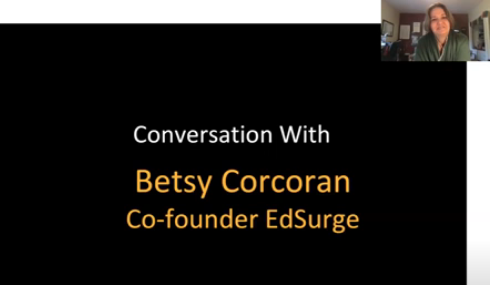Online Education
Thought Leaders in Online Education: Brian Kibby, CEO of Modern Campus (Part 1)

Brian discusses a gigantic white space in continuing education that colleges and universities have left open. Modern Campus is trying to address this gap, among other things. Very interesting conversation.
Sramana Mitra: Let’s start by introducing our audience to yourself as well as to Modern Campus.
>>>Roundtable Recap: December 10 – Spotlight on EdTech

During this week’s roundtable, we had as our guest Betsy Corcoran, Co-founder of EdSurge, for a lively discussion on EdTech.
We then went on to discuss another one of my startup ideas from 8 Startup Ideas for the Post COVID World:
Startup Ideas for the Post Covid World: K-12 Education
You can listen to the recording of this roundtable here:
Thought Leaders in Online Education: Berkeley College Dean of Online Learning Joseph Scuralli (Part 2)
Sramana Mitra: What is that customized IT environment?
Joseph Scuralli: We have a lot of systems that were developed to work together to cater to online. Many institutions host their own learning management systems. We used to do that. We learned that it was more reliable to be in the cloud.
>>>Thought Leaders in Online Education: Berkeley College Dean of Online Learning Joseph Scuralli (Part 1)

Joe discusses open problems in online education.
Sramana Mitra: Let’s start by introducing our audience to Berkeley College and yourself.
Joseph Scuralli: I am the Dean for Online Education at Berkeley College. I’m also Dean of the Larry L. Luing School of Business. I currently carry out responsibilities for both of those positions. I started at Berkeley College in 2007 as a full-time faculty member.
>>>Thought Leaders in Online Education: Quizlet CEO Matthew Glotzbach (Part 5)
Sramana Mitra: Talk to me a little bit about the go-to market strategy. It’s all user-generated content. You have a great coverage of high school, college students, and post-academic learning. What is the go-to market strategy? How do people find you? Is it all word-of-mouth?
Matthew Glotzbach: We’ve been fortunate that all of our user growth has been organic. There are two facets of that. One is word-of-mouth and sharing. Users love the product. We have a very beloved brand. They share with their friends and their study groups.
>>>Thought Leaders in Online Education: Quizlet CEO Matthew Glotzbach (Part 4)
Sramana Mitra: Where is the scalable capacity to train large numbers of retail workers to become healthcare workers? That speaks to the kind of things that you’re talking about. If there were such a transition path with proper credentialing, that would be extremely valuable under the current circumstances.
Matthew Glotzbach: Absolutely. We see that trend of what I might call reskilling or upskilling. We’re already seeing that trend on Quizlet. It’s something that will continue to accelerate.
>>>Thought Leaders in Online Education: Quizlet CEO Matthew Glotzbach (Part 3)
Sramana Mitra: If you were to rank subjects which are the biggest draws, what would those be?
Matthew Glotzbach: Over half of the college students in the US use Quizlet on a regular basis. Over two-thirds of the high school students in the US use us. We see a wide distribution of different types of uses. Language learning is still a strong category for us, but by no means is it a majority. We get used in a lot of sciences, both in the hard sciences as well as the social sciences.
>>>Thought Leaders in Online Education: Quizlet CEO Matthew Glotzbach (Part 2)
Sramana Mitra: What’s happening on the technology end? How are these questions generated? How is the progression being determined?
Matthew Glotzbach: Most of the interactions are with texts and images. We do a lot of natural language processing and understanding of the text. I’ll take a multiple choice question as a simple example.
>>>